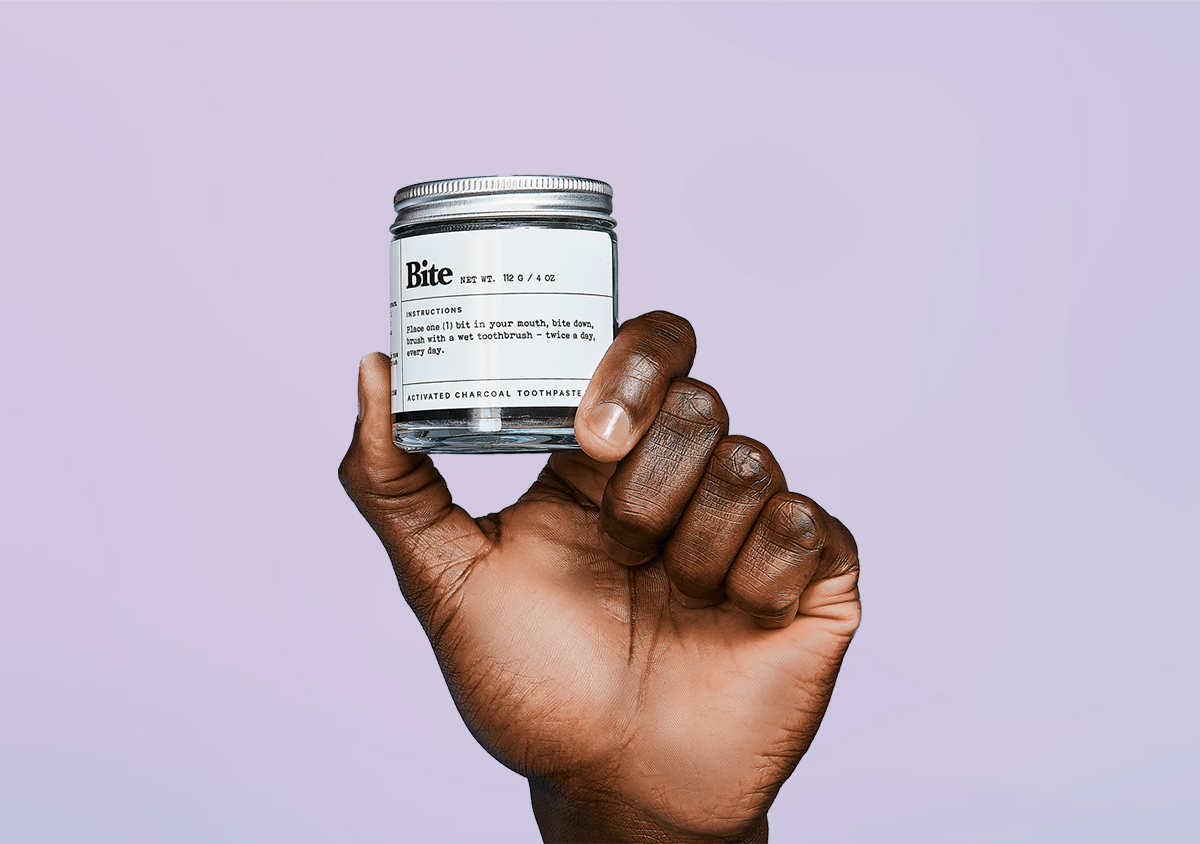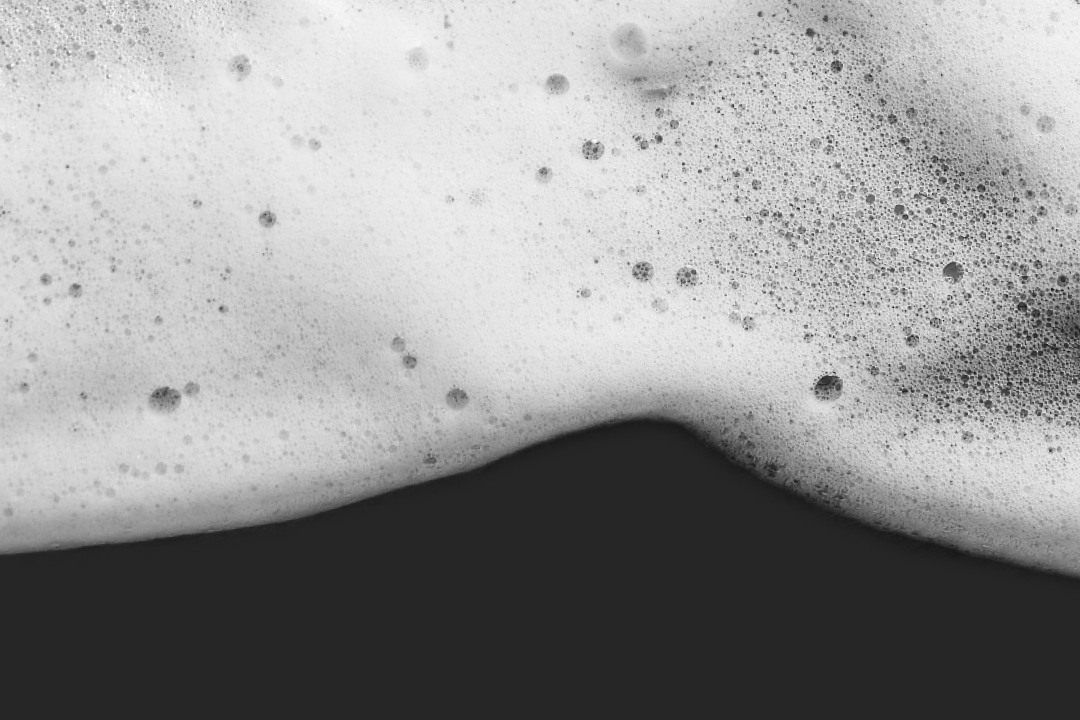The F Word: 3 Reasons Why Our Bits Are Fluoride Free
After two years of formulating and testing (through lab smears and cycling models, never on animals) we finally created a fluoride toothpaste tablet that we have had to put on hold indefinitely for three important reasons.
1. Nano Hydroxyapatite Solves Multiple Problems
TBH, we weren't expecting to come across something that was proven to be comparable to fluoride while also helping to tackle tooth sensitivity. However, while working with dentists to get our fluoride line, we were introduced to nano-hydroxyapatite.
Nano-hydroxyapatite, nHAP for short, "is a calcium crystal that replenishes minerals that are lost in enamel. By doing this, it strengthens enamel and decreases tooth sensitivity." - Samantha Tillapaugh, DDS.
nHAP has been used in oral care in Japan for the past 40 years and is extensively studied. It has proven to be effective in oral care time and time again. As a matter of fact, a fluoride-free nHAP toothpaste was approved by Health Canada (the Canadian version of the FDA) as "anti-cavity" in 2015.
We're all about multitasking, so an ingredient that can strengthen enamel, provide plentiful cavity prevention properties, and kick tooth sensitivity is right up our alley.
nHAP proves that fluoride is not the end-all-be-all of effective oral care, and we are so excited to be using this dentist-recommended ingredient.
We understand that many people may still be unfamiliar with nHAP here in the US, and we want to continue to work with dentists to get the word out about how nHAP is a great fluoride-free option. That being said, it's also important to us that we can offer the products that are best for you.
We ultimately would like to be able to provide you with the choice of fluoride in your toothpaste Bits, which brings us to our other two reasons...
2. Fluoride in a Toothpaste Tablet Is Currently Illegal in the United States
By adding fluoride to toothpaste in the US, the product becomes a drug that is regulated by the United States Food and Drug Administration (FDA).
All FDA drugs in the US must comply with the corresponding FDA Monograph, which is basically a super strict recipe to make and sell the product in the US—selling a product that does not follow the necessary FDA monograph or without obtaining FDA approval is against the law.
Every little detail of the monograph must be followed, and there are no substitutions or alterations allowed. The issue here is that tablets are not included in the monograph. It doesn't say that they aren't allowed, but it doesn't explicitly say that they are either. While this may not seem like a big deal, it’s all about semantics and technicalities.
The accepted forms of fluoride dental dentifrices (fancy name for fluoride oral care products) in the FDA Fluoride Monograph are powder, paste, and gel.
You might be thinking: isn't a tablet just a compressed form of powder? Yeah, that was our first thought too.
But because the monograph has specific dosing directions, powder (which is used by sprinkling on top of your toothbrush) actually is required to have a higher fluoride percentage because it's assumed that some of the powder will fall off your brush - meaning a tablet (which will have a consistent dosage due to its form factor) isn't the same.
Okay, so could it count as a paste? Not so fast.
Because the paste is made of up to 40 percent water, the testing protocols limit the amount of water that is allowed to be used within a product. This means that there are no FDA-approved testing protocols we could follow for tablets specifically, and any changes to the test would have us immediately denied.
It would be a stretch for us to make the case that our tablets were, in fact, a paste or gel. This is because the definition of gels and pastes is very different from that of a pressed powder tablet.
Are there other companies selling fluoride toothpaste tablets in the US? As far as we know and according to the FDA, there are not. If there were these companies, they would not be complying with the FDA’s rules and standards.
We are currently working with several FDA consultants and FDA representatives to continue pursuing the best possible product. However, we have been told there is no record of a formal FDA approval for any toothpaste tablet with fluoride in the US.
While we will keep working with the FDA regarding toothpaste tablets with fluoride, we are proud to say that nHAP is not only an excellent alternative option to fluoride but offers many benefits in its own right.
FDA approval has a strict and well-documented process. So if a company was selling FDA-approved fluoride tablets in the US, there would be a publicly documented paper trail. As of now, there is no such paper trail, and therefore an FDA-approved fluoride tablet does not exist. If there were an FDA-approved product on the market without this documentation, that would be equal parts exciting and confusing. This would mean that there is some kind of workaround to the rigorous and elaborate FDA process.
We are optimistic regarding toothpaste tablets with fluoride in the future, but with the FDA’s guidelines, it simply is not currently a possibility.
This brings us to our final reason...
3. Fluoride in Toothpaste Has To Be Tested on Animals
After talking to our FDA consultants and reps, we were told that even if we could make the case that a tablet can fit in the monograph as stated (or make a case to change the monograph), we would still need to comply or challenge Subpart D - Testing Procedures (a) which states all fluoride products must meet a biological testing requirement, as in the rat caries test.
Fair warning: If you're not okay with reading about the harsh realities of animal testing, I recommend skipping down to the "Where We Stand Now" section of this article.
According to the FDA fluoride Monograph, all fluoride oral care products must meet a biological testing requirement. The most common is the rat caries test, where eight-day-old rats (called pups) are kept in a lab and have their teeth brushed and bacteria levels measured. After three weeks, the pups are killed (gassed with carbon dioxide which is under scrutiny), and their jaws are cut out to be studied under a microscope.
The rat caries test is not only profoundly unethical; it is also not the most accurate way to determine the effectiveness of fluoride products.
In 2017, the American Dental Association (ADA) petitioned the FDA to allow companies to bring a fluoride product to market without doing the rat caries test. The FDA declined, meaning the requirement is still very much, well, required.
The monograph says (c) alternative testing can be used; however, the only alternative test that is formally allowed is the intraoral appliance model (IOA). There are no other non-animal tests officially accepted by the FDA.
However, after talking to FDA consultants and FDA product testing companies, many companies have petitioned to do the same IOA testing.
In talking to FDA consultants, we were explained a few scenarios that might be going on. Some of these "cruelty-free" companies with fluoride products could be selling a formula that was already tested on animals before. So they would say they didn't test on animals while conveniently leaving out the fact that their formula was already tested on animals just to meet FDA guidelines in the first place.
In reality, some of these companies and products may be operating in a legal grey area (remember, legally, monographs must be followed to the letter, which is why this would be a grey area), or some may have petitioned the FDA and been granted an exemption (which should be public record if this is the case).
We are absolutely against animal testing and will not test on animals or allow our products to be tested on animals for any reason or in any way.
Where We Stand Now
Suppose you’ve stuck around this long; first of all, hello. I know this is a lot. Legal stuff is fun, isn’t it? If you made it this far, you must be as obsessed with oral care (or as against animal testing) as I am, and as we all are here at Bite.
We're still invested in being able to offer a version of our Bits that contain fluoride. However, with all of the legal roadblocks, as they are, as well as the fact that we've found a truly equal and double-duty ingredient for oral care in our usage of nHAP, fluoride toothpaste tablets are no longer our priority.
In the meantime, please dig into the research, talk to your dentist about nHAP, and as always, thanks so much for kicking the tube with us!
Sources:
(PDF) Remineralization of Early Caries by a Nano-Hydroxyapatite Dentifrice | Research Gate
Fluoride Uses, Side Effects & Warnings | Drugs.com
Drug Applications for Over-the-Counter (OTC) Drugs | FDA
Code of Federal Regulations Title 21 | FDA
Rulemaking History for OTC Anticaries Drug Products | FDA


